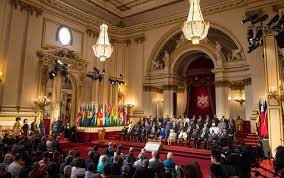We can make the Commonwealth a real global power

*Why should our 54 countries not lend weight to each other in international bodies, compounding our influence as the EU does?
By MUHAMMADU BUHARI

What becomes of the Commonwealth should one of its 15 members that is not a republic join those 39 others which are? With Jamaica considering such a move, this question is being asked. But it is misplaced: the modern Commonwealth was constituted in 1949 specifically to accommodate a republic – newly independent India – precisely after such constitutional change.
Still, it is right to debate the Commonwealth’s future. Though perfectly sustainable in its current form, it would be a disservice to its members should current levels of co-operation be the limit of our aspirations.
For a start, we should strive to reduce trade barriers, given the unity nearly all of us hold through the English language, jurisprudence and education systems. We might explore grouping more readily together at intergovernmental forums such as the United Nations to deliver outcomes for one member individually or all collectively. We should work closer on defence interoperability and mutual support in the fight against global terrorism – now centred on Africa, and which threatens new waves of refugees into the West.
Some will point to factors such as Commonwealth countries’ membership of regional trade blocs, UN ballots with members voting in opposite ways and a lack of military compatibility as proof that closer cooperation cannot be achieved. It is possible to prove these people wrong – but only if we attempt to do so.
The forthcoming Commonwealth Heads of Government Meeting (CHOGM) this June should be a moment when the potential for our club is reimagined. This bi-annual senior decision-making body is being hosted by Rwanda: a republic no less, and prescient, when the largest contingent of Commonwealth countries is African.
Not far from the official agenda will be the question of how Brexit will continue to affect us all.
Already the U.K. Global Tariff (UKGT) has reduced, removed or simplified tax on thousands of imported goods, which is an important step in reconfiguring Commonwealth trade. When the club’s largest economy was unable to practice the free trade it long preached, others had little incentive to lower barriers. Association within their own trade blocs is not prohibitive. There is still much more that members can do inside their respective frameworks.
A number of the Commonwealth’s African members have now signed product-based trade agreements with the UK. But a potential deal with the African Continental Free Trade Area (AfCFTA), set to become the world’s largest free trade area, heralds the greatest opportunity.
The UK signed the world’s first memorandum of understanding with the nascent bloc last year, with a future deal securing free trade simultaneously with nineteen African Commonwealth members, collectively representing the majority of Africa’s GDP. It would likely presage further agreements between AfCFTA and other members, further opening intra-Commonwealth trade.
With trade could come greater defence cooperation. African Commonwealth members are active in many theatres across the continent, whether battling ISIS-affiliated militants across the Sahel region in the West, the Horn of Africa in the East, or Mozambique in the South. Arms and defensive equipment are part of the solution.
There is no reason why one of the world’s foremost military manufacturers should not sell more widely to our association when it is a group of allies. When Britain does not, they must look elsewhere. Today we have a mosaic of incompatible systems. But particularly in Africa, where members find themselves on the same missions, interoperability would make a material impact on the ground.
And in diplomacy, when trade and defence ties are drawn closer, so too do geopolitical interests. The EU’s 27 members tend to have each other’s backs in, for instance, UN votes. Why should the 54 Commonwealth partners not similarly organise, lending weight to each other in such bodies and wielding more influence?
At CHOGM, these new opportunities can be grasped. What holds us back is only the limit of our ambition. For those who say this cannot be done, I say we will never know until we try.
*Muhammadu Buhari is President of the Federal Republic of Nigeria
First published 25 April 2022 in The Telegraph UK per this link: https://www.telegraph.co.uk/news/2022/04/25/can-make-commonwealth-real-global-power/








